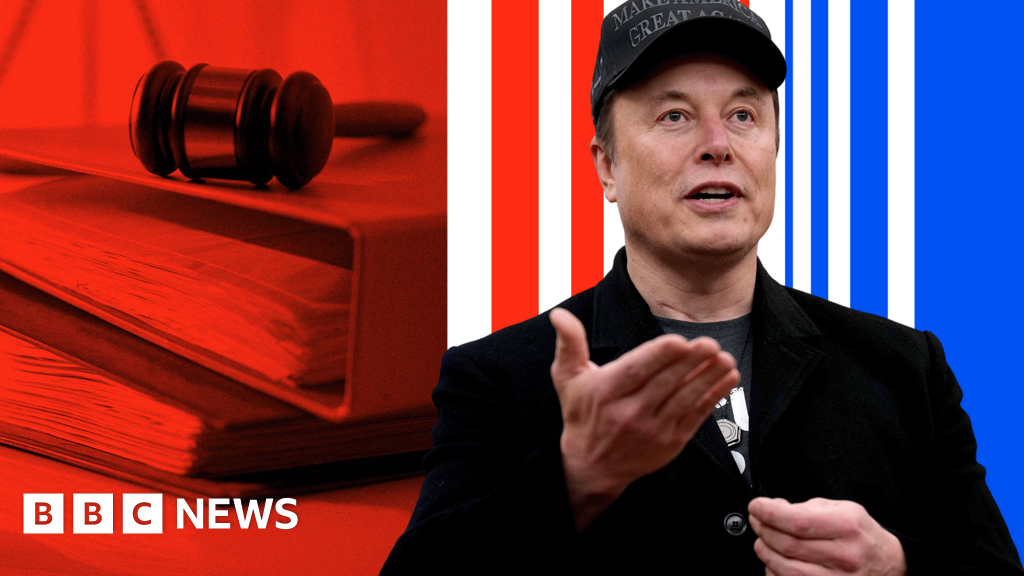What is Doge and why is Musk cutting so many jobs?
- BBC News
A new advisory body created by US President Donald Trump and led by the worlds richest man has been tasked with cutting US government jobs and other spending.
Elon Musk is leading this effort to drastically reduce the federal workforce and weed out what he sees as taxpayers money being wasted.
But his Department of Government Efficiency (Doge) has encountered legal obstacles, allegations of conflicts of interest, and fears that it will wreak serious damage.
Explaining his actions to reporters in the Oval Office, Musk defended his plans and denied the assertion of rival Democrats that he embodied a "hostile takeover" of government.
Polling suggests cutting government spending has widespread support.
Despite its full name, Doge is not an official government department, which would have had to be established by an act of Congress.
Instead it came into being through one of Trumps presidential executive orders, and operates as an advisory body with at least four employees dedicated to each government agency.
Part of Doges mission, says the order, relates to IT upgrades aimed at boosting efficiency. It must finish its work by July 2026.
Many of Doges staff appear to be young people with tech backgrounds.
Yes. Musk initially said he would perform his role as an outside volunteer but the White House later said he was operating as an unpaid special government employee.
That designation is officially defined as those working for the government for 130 days or less in a year.
To some supporters of this new body, Doges outsider status - as well as its somewhat vague mandate - will increase its effectiveness.
"Theyre a little more untethered to the bureaucracy itself and to the systems that slow processes down around here," Republican Senator Kevin Cramer of North Dakota told the BBC. "I think the lack of parameters is part of what will make them effective."
Its mission, says Musk, is to save taxpayers money and reduce US national debt, which stands at $36tn (£28.9tn).
Initially he said he hoped to save as much as $2tn a year, but later tempered this estimate.
Musk has said he wants to end the "tyranny of the bureaucracy", what he describes as a fourth branch of government working against Trumps agenda. Critics of his work see a simpler ideological motivation at play.
"They are not going to go into agencies that are doing things they like. They are going into agencies they disagree with," Douglas Holtz-Eakin, a former Republican director of the Congressional Budget Office (CBO), told Reuters news agency.
It is unclear how much money Doge has managed to save so far, although its X account gives regular, celebratory updates on what they say has been cut. Among its headline-making actions are:
Doge enjoys broad popular support, a poll by the BBCs US partner CBS News has suggested.
This indicated that a majority of Americans - especially Republican voters - supported its work, even if they disagreed over how much influence Musk should have personally.
The size of the permanent workforce currently exceeds two million and one of the largest increases was in 2023, partly due to major investment by the Biden administration in infrastructure projects.
David Ditch, a senior analyst at the Economic Policy Innovation Center, a conservative think tank, says Doges work is needed.
"Theyre shining a very bright spotlight on various parts of the federal government and they asking, whether its the American public, whether its moderate members of the Republican caucus - is this how you want Americas tax dollars to be used?"
Political opponents and government watchdogs accuse Doge of acting without transparency and spreading misinformation about government spending - and accuse Musk of overstepping his authority as an unelected official.
Critics highlight Musks potential conflicts of interest, given the billions in contracts his businesses hold with the US government. Trump and Musk deny that any issues will arise.
Multiple groups including unions and state attorneys general have sued Doge and the wider Trump administration over their plans, and Democrats accuse them of tampering with funding approved by Congress that is outside the presidents scope. The White House denies that the work has broken any laws.
Several times, the courts have stepped in to halt the cost-cutting moves, at least once blocking Doge directly when a judge stopping the agency from accessing personal data held within US Treasury records.
When speaking to reporters in the Oval Office, Musk said he expected to be scrutinised for his work, but insisted that Americans had voted for "common sense" government reform.
But pundits question whether he can enact his bold pledges.
Elaine Kamark, a senior fellow in governance studies at the Brookings Institution, told the BBC that efforts to streamline government spending "can be done", highlighting her own work for President Bill Clinton in the 1990s.
But she labelled Musks idea of slashing a third of government spending "ridiculous", since so much of the budget was mandatory, including popular programmes like Social Security and Medicare.
With additional reporting by Jessica Parker and Cai Pigliucci